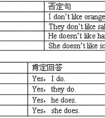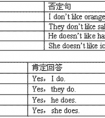动词填空。1. _____ your family _____ (read) books on Sundays?2. I find your shoes over there. But where _____ (be) mine?3. Look! The boy _____ (have) a kit-七年级英语
题文
| 动词填空。 |
| 1. _____ your family _____ (read) books on Sundays? 2. I find your shoes over there. But where _____ (be) mine? 3. Look! The boy _____ (have) a kite in his hand. 4. Let's help the old man _____ (cross) the road. 5. Mike, _____ ( not fly) the kite here. It's dangerous. 6. Why_____ your sister _____ (wash) clothes every day? It's a good habit (习惯). 7. Would you like _____ (go) to the zoo this Sunday? 8. He _____ (not do) his hom  ework on Friday evening. He does it on Saturday. ework on Friday evening. He does it on Saturday.9. Mary enjoys (chat) on the Internet. 10. Mr. Zhang _____ ( teach) us English. We all like him. |
答案
| 1. Do. read 2. are 3. has 4. cross / to cross 5. don't fly 6. does, wash 7. to go 8. doesn't do 9. chatting 10. teaches |
据专家权威分析,试题“动词填空。1. _____ your family _____ (read) books on Sunday..”主要考查你对 实义动词,系动词,助动词,不定式,动名词 等考点的理解。关于这些考点的“档案”如下:
实义动词系动词助动词不定式动名词
考点名称:实义动词
- 实意动词:
即行为动词,表示动作的动词。实义动词与系动词是相对的,能独立用作谓语。
它分为及物动词和不及物动词两种:
及物动词是指后面要求有直接宾语的动词;
不及物动词指后面不需要跟宾语的动词。 实意动词使用方法:
及物动词
后面必须跟宾语意义才完整的实义动词,叫做及物动词(transitive verb)。如:
I believe that the committee will consider our suggestion.我相信委员会将会考虑我们的建议。
“How long can I keep the book ?”Harry asked.哈里问:“这本书我可以借多久?”
Dr. Bethune set us a good example. 白求恩大夫给我们树立了好榜样。
Crude oil contains many useful substances.原油含有许多有用的物质。
不及物动词
本身意义完整后面不须跟宾语的实义动词,叫做不及物动词(intransitive verb)。如:
Birds fly.鸟会飞。
It happened in June 1932.这件事发生于一九三二年六月。
My watch stopped.我的表停了。
She spoke at the meeting yesterday evening. 她在昨天晚上的会上发了言。
兼作及物动词和不及物动词
英语里有不少实义动词可以兼作及物动词和不及物动词。这样的动词又有两种不同的情况
a)兼作及物动词和不及物动词时,意义不变。试比较:
Shall I begin at once?我可以立刻开始吗?(begin作不及物动词)
She began working as a librarian after she left school.她毕业后当图书馆管理员。(began作及物动词)
When did they leave Chicago?他们是什么时候离开芝加哥的?(leave 作及物动词)
They left last week. 他们是上周离开的。(left 作不及物动词)
b)兼作及物动词和不及物动词时,有时意义不尽相同。如:
Wash your hands before meals.饭前要洗手。
Does this cloth wash well? 这布经得起洗吗?- 英汉实意动词用法比较:
与汉语的比较,有时英语动词的及物和不及物的用法,与汉语的用法不一样,请注意下列两种情况:
a)有的动词在英语里只能用作不及物动词,而汉语则可用作及物动词,如arrive到达,agree同意,listen听。英语里这些动词后面常接介词。如:
We arrived at the railway station at noon.
我们于中午到达火车站。(at不能省去)
(比较:We reached the railway station at noon.)
Everybody listened to the lecture with great interest.
每个人都很有兴趣地听讲课。(to不可省去)
(比较:We all heard the lecture.)
Do they agree to the plan?他们同意这个计划吗?(to不可省去)
b)有的动词在英语里能用作及物动词,而在汉语里则不能用作及物动词,如serve为…服务。
Our children are taught to serve the people wholeheartedly.
我们的儿童被教以全心全意为人民服务
用于be动词之后,实义动词之前。 实意动词的用法:
肯定句:
主语+动词过去式+其它
否定句:
主语+助动词didn‘t+动词原型+其他
一般过去式:
Did+主语+动词原型+其他
考点名称:系动词
- 系动词:
亦称连系动词。作为系动词,它本身有词义,但不能单独用作谓语,后边必须跟表语,亦称补语(形容词),构成系表结构说明主语的状况、性质、特征等情况。 - 系动词的分类:
1)状态系动词
用来表示主语状态,只有be一词,例如:
He is a teacher. 他是一名教师。(is与补足语一起说明主语的身份。)
2)持续系动词
用来表示主语继续或保持一种状况或态度,主要有keep, rest, remain, stay, lie, stand, 例如:
He always kept silent at meeting. 他开会时总保持沉默。
This matter rests a mystery. 此事仍是一个谜。
3)表像系动词
用来表示"看起来像"这一概念,主要有seem, appear, look, 例如:
He looks tired. 他看起来很累。
He seems (to be) very sad. 他看起来很伤心。
4)感官系动词
感官系动词主要有feel, smell, sound, taste, 例如:
This kind of cloth feels very soft.
这种布手感很软。
This flower smells very sweet.
这朵花闻起来很香。
5)变化系动词
这些系动词表示主语变成什么样,变化系动词主要有become, grow, turn, fall, get, go, come, run.
例如:
He became mad after that. 自那之后,他疯了。
She grew rich within a short time. 她没多长时间就富了。
6)终止系动词
表示主语已终止动作,主要有prove, turn out, 表达"证实","变成"之意,例如:
The rumor proved false. 这谣言证实有假。
The search proved difficult. 搜查证实很难。
His plan turned out a success. 他的计划终于成功了。(turn out表终止性结果) 系动词使用的注意事项:
系动词本身有一定的词义,不能单独作谓语,后面必须与表语连用。复习系动词时,必须注意以下几个问题:<?xml:namespace prefix = "o" ns = "urn:schemas-microsoft-com:office:office" />1.be是最重要的系动词,主语不同,be的形式也不同,且有时态的变化。
a通常表示主语的特征、状态和身份等,后面接形容词、副词、名词、介词短语、不定式、v-ing
- 最新内容
- 相关内容
- 网友推荐
- 图文推荐
| [家长教育] 孩子为什么会和父母感情疏离? (2019-07-14) |
| [教师分享] 给远方姐姐的一封信 (2018-11-07) |
| [教师分享] 伸缩门 (2018-11-07) |
| [教师分享] 回家乡 (2018-11-07) |
| [教师分享] 是风味也是人间 (2018-11-07) |
| [教师分享] 一句格言的启示 (2018-11-07) |
| [教师分享] 无规矩不成方圆 (2018-11-07) |
| [教师分享] 第十届全国教育名家论坛有感(二) (2018-11-07) |
| [教师分享] 贪玩的小狗 (2018-11-07) |
| [教师分享] 未命名文章 (2018-11-07) |


![How much does it ______ to fly from Yancheng to Hainan Island?[ ]A. cost B. payC. spend D. take-七年级英语](http://www.00-edu.com/d/file/ks/4/2/shiyidongci/2020-01-05/small7dcf2f05998de63e10cc3629787031c81578210087.png)

![He always _____TV in the evening. He _____ listening to the radio. [ ]A. watch, don't like B. watches, doesn't like C. watching, don't like D. watch, do-七年级英语](http://www.00-edu.com/d/file/ks/4/2/shiyidongci/2020-01-05/small45d599b4a60b84e61cec210bfbf051f51578214524.png)
![I'd rather ___ to the Mcdonald's Restaurant because I like to listen to quiet music.[ ]A. to go B. going C. go D. went-八年级英语](http://www.00-edu.com/d/file/ks/4/2/shiyidongci/2020-01-05/small1767bba1727fef2c035c53dcbd9bc20e1578209517.png)
